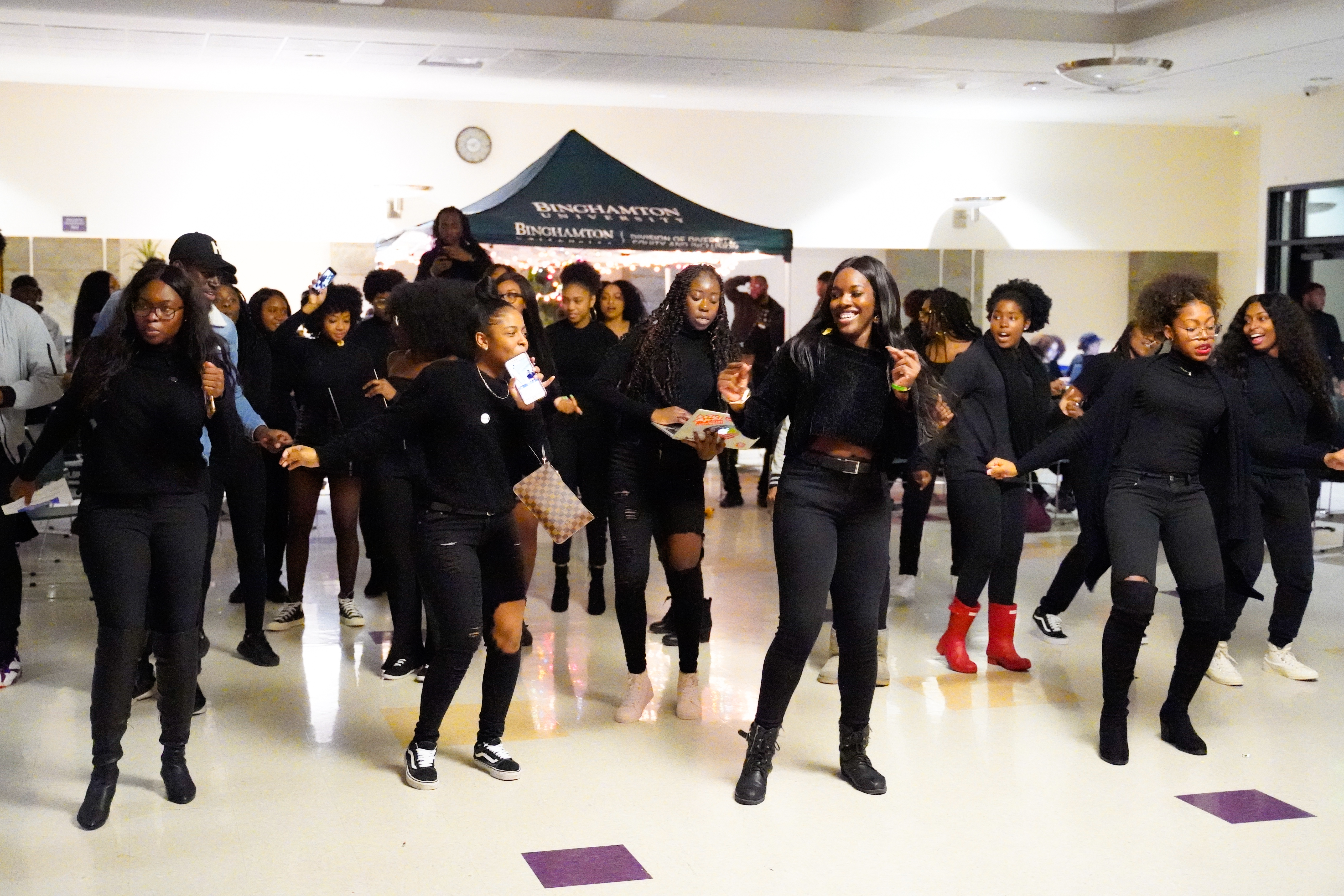The day before midterm elections, Binghamton University’s Black Student Union (BSU) held its annual Black Solidarity Day Festival to acknowledge and showcase the influence and sociopolitical power black people possess within the campus community.
On Monday, more than two dozen students and faculty gathered at the Pegasus Statue near Glenn G. Bartle Library to recognize the black lives lost to police brutality and their inability to cast a vote. BU’s Multicultural Resource Center (MRC) lined the Spine with hundreds of black flags with handwritten names of those lives lost since 2015.
Black Solidarity Day was created in 1969 to bring black men, women and students together to discuss their political status and personal plans for the future. The day mostly aims to focus on the value of education, the power of black economics and community building.
According to Kelly Clark, director of the Q Center, Black Solidarity Day typically includes self-reflection and introspection and recognizing the importance of exercising the right to vote.
“All of those flags represent a vote that can’t happen,” Clark said. “Some of us had ancestors that literally died to earn our right to vote. There is no excuse that we could use to not cast a ballot [on Election Day]. We can’t tell you who to vote for, but what we can say is to take the time to vote your conscience and find out who’s running and vote for what you want this society to look like.”
Nicole Sirju-Johnson, interim chief diversity officer and director of the MRC, said during Black Solidarity Day, black Americans come together as a community and separate from society to strategize how to best vote in the election the following day.
Students were encouraged to post on social media with their pledge to cast their ballots on Election Day. Andy Jean-Baptiste, vice president for multicultural affairs of the Student Association (SA) and a senior double-majoring in economics and philosophy, politics and law, said he pledged his vote for those who are not able to vote for themselves.
“Voting is a very important right,” Jean-Baptiste said. “You can’t immediately change politics and policy, but you can change your politicians. You can change the people who will be representing you and voting on your behalf, so vote for someone who will have your community’s and your best interests at heart.”

Students don all black to celebrate Black Solidarity Day and the Black Student Union’s 50th year on Binghamton University’s campus Monday in Old Union Hall.
Sarah Merke, political correspondent for BSU and an undeclared sophomore, said the day’s events aimed to highlight the impact made by people of color and to bring the multicultural community together prior to Election Day.
“It’s to show the impact that people of color have on this campus, and, I guess, nationally, on this country,” Merke said. “So basically, it’s promoting people of color to get together and go out and vote, to show our numbers and our unity among each other, so the Day of Absence beforehand was to show a day of absence without people of color, and how a day functions with us and that we are needed in a day, people of color, to show our impact and our worth.”
Yasmine Nartey, a junior majoring in philosophy, politics and law, said the celebration in Old Union Hall connected multicultural students with one another.
“I think it’s important to continue to spread the culture in ways we know how — this is one of them,” Nartey said. “So, this event is one about, first of all, getting acquainted with other organizations within the multicultural community, and then building those bridges also reaching out to people that normally wouldn’t come to these events.”
Aminata Jaiteh, president of BU’s chapter of NAACP and a senior majoring in sociology, said the event gave students the opportunity to join together and celebrate their culture, something that doesn’t often occur because of the University’s demographics and students’ busy lives.
“Especially being on a predominantly white campus, what ends up happening is we don’t necessarily get to see all the people of color on the campus,” Jaiteh said. “So just to get an opportunity to have all the multicultural organizations in one place allows for us to come together, create a safe space, talk about what exactly we love about our culture and embrace one another better, and I feel like we don’t get to do that every day because we’re so focused on school.”
In his speech, Brown said the black community must continue their education to progress as a collective and to fight against racism.
“For conscious black ignorance, which contradicts the goals of black excellence, is perhaps the dominant culture’s most effective weapon against black and minority solidarity and advancement,” Brown said. “If being black and educated is dangerous, then I aspire to be as dangerous as I can be. In fact, we at Binghamton [University] should all aspire to be as dangerous as we can be, for cultivating and nourishing our intellect keeps us on the path for progress and away from the shackles of ignorance.”



